Harry Mulisch and Connie Palmen
Harry Mulisch, Gerard Reve and Willem Frederik Hermans are regarded as the big three of Dutch literature from after the Second World War. Connie Palmen belongs to a completely different generation of authors. While Mulish could still be considered a humanist modernist, Palmen has been regarded one of the most important representatives of the all-relativising postmodernism in Dutch prose since (and especially because of) her debut De wetten [The Laws] (1991).
Harry Mulisch
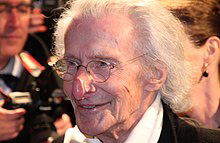
In his writing, Mulisch explores reality and at the same time he is constructively searching for the organism of language that, to use Mulisch's words, gives birth to him over and over again like a 'second mother'. Literature as a possibility to find oneself, or rather literature as a possibility to create something as an author, that is what Mulisch and Palmen have in common, despite the great differences between their points of departure in their writing.
"Like every human being, a letter too has a soul and a body. Its soul is what it says, and its body is what it is made of: ink or stone." (Harry Mulisch in Die Entdeckung des Himmels)
The stone bride bed
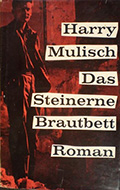
Already in his first novels, Mulisch had immediately set the tone for his entire oeuvre. Before you know it, life takes on mythological dimensions, small events lead to great dramas; suddenly one is playing the leading role in a drama of life and death. Mulisch was a master of the oxymoron, of combining concepts that contradict each other, such as The Black Light, in which light and dark are linked.
The first titles by Harry Mulisch to appear in German translation were published by Henri Nannen. After the Second World War, Henri Nannen was a person of great standing in Germany and also chief editor of the weekly magazine Stern (1949-1980). The translation of Het stenen bruidsbed [The Stone Bridal Bed], the story of Norman Corinth who bombarded Dresden during the war and later returns for a congress, appeared with Nannen under the title Das steinerne Brautbett.
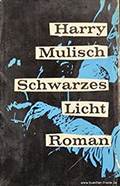
“[...] one thinks: Aha, the murderer is drawn back to the scene of the crime. But he has no personal sense of guilt; it doesn't matter whether he was over Dresden that night. He is a man of our century and as such entangled in the complex of guilt that the whole generation has to bear; Dresden, the stone bridal bed - because he felt the lust of destructive frenzy - is only the incidental symbol of his complicity for him.” (Fürst, 1960)
In the 1960s, Nannen also published Der Diamant [The Diamond] (1961) and Schwarzes Licht [The Black Light] (1962).
Strafsache 40/61
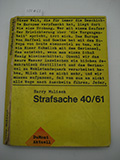
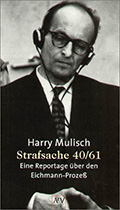
Harry Mulisch was not particularly satisfied with his first publisher in Germany. (Mulisch, Müller, 1989). And not without reason. His first translations were barely mentioned by the press.
In the early sixties Harry Mulisch was observer at the Eichmann trial in Jerusalem. Mulisch's report on the trial (Strafsache 40/61) appeared in the German language area in 1963. His report has much in common with Hanna Arendt's famous book Eichmann in Jerusalem.
The correspondence between Hanna Arendt and Harry Mulisch from 1964 shows that they mutually discovered with some surprise how much "resemblance" (De Goeie, 2014) their records proved to have.
Strafsache 40/61, (transl. Johannes Piron) was published in 1963 not by Nannen but by DuMont. As previously mentioned, Mulisch had not been satisfied with his first publisher. The fact that Henri Nannen, had worked for the subunit "Südstern" of the "SS-Kriegsberichter-Kompanie" named after Kurt Eggers during the war, may have played a role in this decision. Moreover, Nannen also published books by old SS comrades, such as Die Wüstenfuchse by Paul Carell. Willem Sassen, who became known at the end of the 1950s as the interviewer of Adolf Eichmann, was also a member of the "SS-Standarde Kurt Eggers". Had Mulisch found this out in the meantime? Was this ultimately the reason to leave Nannen?
In any case, DuMont, at the time specialised in art books, was also not the right place for Mulisch's new book, it did not get the attention it deserved. This only changed later on.
In 1987, Strafsache 40/61 was re-published and in 1995 again, this time by Aufbau in Berlin. There the book saw three editions until 2002.
The Assault

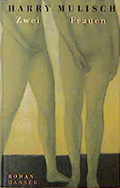
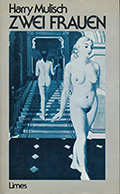
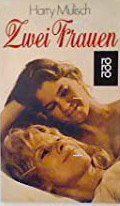
A year after the film adaptation of Twee vrouwen [Two Women] (1975) under the title Twice a Woman, starring among others Bibi Andersson and Anthony Perkins, Zwei Frauen was published by Limes in 1980.
The reception of the book was rather disappointing. It was dismissed as a "fabrication of love" (Stern, 1980) as a "constructed story with pseudo-philosophical scribblings" (Stern, 1980). Nevertheless, Zwei Frauen was republished two years later by Rowohlt, in 1998 by Hanser and again by Rowohlt in 2000.
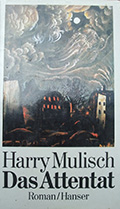
Harry Mulisch's breakthrough in the German language area came about with the publication of the translation of Mulisch's bestseller De Aanslag [The Assault]. Das Attentat, a translation by Anneleen Habers, was published by Hanser in 1986.
Mulish's novel about Anton Steenwijk, who spends his entire life struggling with his trauma from the war, became an almost immediate success. As early as July 1986, the book was voted the best book of the month by the Deutsche Akademie für Sprache und Dichtung.
The criticism is highly laudatory:
"Das Attentat", an important work of literary-dialectical development, can be compared with some of Siegfried Lenz's exemplary works - the novels "Stadtgespräch", "Deutschstunde", the play "Zeit der Schuldlosen". Mulisch, who is one year younger, proves himself to be a distinguished combiner of literary genres in his novel; he fuses the advantages of the novellistic "falcon technique" with those of epic, broad narration and the exciting psychology of revelation and additionally incorporates philosophical prose in his material." (Herms, 1986)
Frankfurt 1993
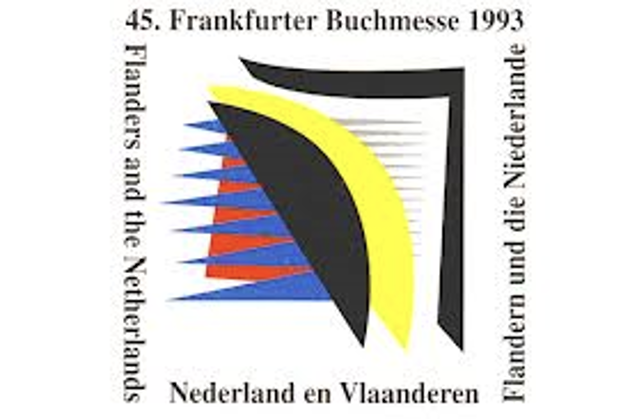
“If an event like this is possible, is it not a sign that world peace is not excluded in principle? Writers, publishers, readers of all countries, unite!” (Mulisch, 1993) (#Fairs)
When the Netherlands and Flanders were guests of honour at the Frankfurt for the first time, Harry Mulisch is already a star. Das Attentat was being sold like hotcakes (23rd edition in 1993) and in the meantime Hanser had published a whole series of new titles: Augenstern [The Pupil] (1989), Die Elemente [The Elements] (1990); Höchste Zeit [Last Call] (1990).
As the "Doyen" of Dutch literature, Harry Mulisch gave the opening address. A few months earlier Mulisch's masterpiece Die Entdeckung des Himmels [The Discovery of Heaven] (1993) had appeared. Die Entdeckung des Himmels is a total novel in which all of Mulisch's themes and motifs come together. It is both a psychological and a philosophical novel, both an adventure novel and a development novel, both a love novel and a mystery novel.
"The Dutch national poet Harry Mulisch reaches for the stars with his "Discovery of Heaven"" (Halter, 1993)
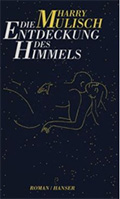
The admiration for Die Entdeckung des Himmels is great. But as far as the quality of the book is concerned, not everyone is of the same opinion.
In Das Literarische Quartett (Das Literarische Quartett 26, 15.8.1993 - www.youtube.com/watch) there was a heated discussion about the meaning of this work, of the "Fireworks of rotten magic " (Helmut Karasek) and the role of Harry Mulisch as "God's representative on earth " (Sigrif Löffler). Anyway, although Marcel Reich Ranicki firmly believed that a novel of 800 pages can only be bad and that Die Entdeckung des Himmels is a book "without poetry" (Marcel Reich-Ranicki), the book hit like a bombshell. By the time the book was so viciously criticised by the members of the quartet, it had already been on the bestseller lists for months.
De ontdekking van de hemel [The Discovery of Heaven] appealed to many readers, not only in the Dutch but also in the German language area, more than 750.000 Dutch copies were sold. In the German language area, the success was comparable. Already in 1995, the 20th edition of Hanser's Die Entdeckung des Himmels hit the market and in 1996, the hundred-thousandth copy of Rowohlt's edition was printed. After 2000, Mulisch's work continued to be observed in Germany, but the successes of Das Attentat and Die Entdeckung des Himmels were not repeated.
Connie Palmen
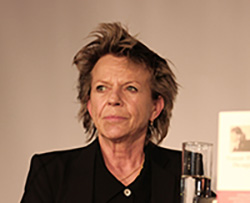
Unlike Harry Mulisch, Connie Palmen did not need a long run-up phase in the German language area. Palmen made her Dutch debut in 1991 with De wetten [The Laws]. The book was very well received and within a short time it became a bestseller. This went a little differently in the German language area.
Palmen was one of the promising authors who were selected for the 45. Frankfurter Book Fair to present Dutch literature to the German public. The translation of De wetten appeared with Diogenes in Zürich in 1993.
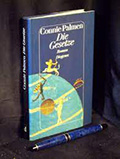
The reviews of the first novel by the "flying Dutchwoman" (Platonische Hure, 1993) were very favourable: "highly intelligent and artful" (Platonische Hure (2), 1993) writes Der Spiegel, "very lively and equally philosophically told" judged Rolf Grimminger in the Süddeutsche Zeitung (Grimminger, 1993).
"A miracle - the miracle of a successful modern coming-of-age-novel - is that with so much concept, with so much cleverness and overview, the storytelling does not come up short. That profundity and self-irony, thought and simplicity, detached subjectivity and the laconic delicacy of scenic description can coexist." (Dieckmann, 1993)
wrote Dorothea Dieckmann in Die Zeit, but not everyone shared this opinion. Caro Maurer expressed her annoyance with "confused" in Die Welt (Maurer, 1993) and Susanna Fluehmann criticised the superfluity in the Tagesanzeiger: "The life of the protagonist is overflowing and yet fragmentary. The same applies to Palmen's novel" (Fluehmann, 1993).
Palmen was not as successful with Die Gesetze as she had been with the Dutch original, but it had brough by her breakthrough nontheless.
Palmen attained a permanent place in the literary landscape of the German language area. After 1993 all of Palmen's works were almost immediately translated into German.
All addictions are desires (Adel, 1997)
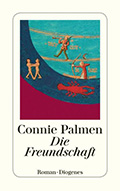
In 1995 Connie Palmen received the prestigious AKO Literature Prize for her second novel, De vriendschap [The Friendship]. A year later the book appeared in German translation. Palmens story about the friendship between Kit and Ara was also enthusiastically received in the German language area. "Only a few storytellers can write about love-relationships, futility, addiction and shyness in such a nuanced and quasi-autobiographical way as Connie Palmen", wrote Rolf Grimminger in de Süddeutsche Zeitung (Grimminger, 1996), "light and full of homorous laconism [...] skilful and unobtrusive" found the Wiener Zeitung (Schiefer, 1997) and the Frankfurter Allgemeine wrote:
"For those who wish reading to stimulate the senses and the mind, this book can be recommended." (Hinck, 1996).
Palmen's third novel was eagerly awaited.
"You can be very happy even when you are grieving (Connie Palmen) (Hieber, 2015)
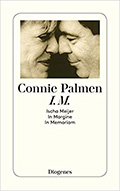
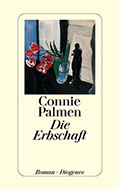
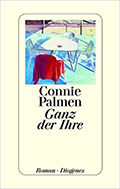
The next phase of the reception of Connie Palmen's oeuvre in the German-speaking world began with the translation of I.M. (1998). I.M. - Ischa Meijer in Margine, in Memoriam was published in 1999 by Diogenes, Palmen's publishing house in Switzerland.
Palmens heartrending story about her love for and her relationship with Ischa Meijer, who died in 1995, convinced the German press: "Connie Palmen writes equally insightful and intelligently humorous, a rarly found good mix." judged Barbara Sichermann in Die Zeit (Sichermann, 1999), and in the Wiener Zeitung Gerald Schmickl wrote that Connie Palmen more than convincingly succeeds to connect "emotions and reflexivity" (Schmickl, 1999). That death had driven Connie Palmen to the brink is obvious. The way in which she now writes against death is convincing (Grimminger, 1999).
"This book leaves its mark on the reader. Connie Palmen tells about love and death so worldly, unpretentious and vividly that her story can be counted as great confessional poetry." (Kastura, 1999)
Vividly recounting about love and death - this set the tone for the reception of Palmen's subsequent novels. Die Erbschaft [The Inheritance] (2001) about the incurably ill writer Lotte Inden was not only read as a novel about an unusual relationship between two people, but as a "novel about writing, about death, about literature" (Westdeutscher Rundfunk, quoted at Connie Palmen.nl). It was no different with Ganz der Ihre [All Hers] (2004). In this book, Connie Palmen tells the story of her relationship with her dead lover one more time, as a kind of sequel to I.M. In this book, Ischa Meijer is disguised as the journalist, punter and Don Juan Salomon Schwartz. Five women set out to identify what makes him so irresistible.
"Wanting to fathom the motives, practising perspicacity and maintaining humour, observing even when it hurts, and finally writing it down, without frills, with great frankness, but without larmoyance: Connie Palmen has already succeeded in all this in her celebrated first novel Die Gesetze. In Ganz der Ihre she has taken this demanding concept, which is addictive and gets by entirely without chit-chat, to new mastery." (Barthelemy, 2004)
Place of honour on the suffering shelf
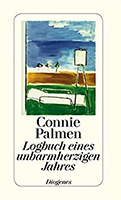
In 2010, Diogenes published Luzifer, a book about the tragic death of the wife of Dutch composer Lucas Loos, and in 2016 she told the story of Ted Hughes' marriage to Sylvia Plath, who ultimately committed suicide. This book, which was awarded the Libris Literature Prize in the Netherlands, was also highly praised in the German language area, but the place of honour on the "shelf for suffering" (Cosack, 2013) had already been conquered by Palmen in 2013 with Logbuch eines unbarmherzigen Jahres, Connie Palmen's story about the loss of her first husband.
In most of Palmen's books death is the main character, but writing about and against death, about and against pain, about and against forgetting, Connie Palmen writes for life. Like Mulisch she creates a literary organism from which and into which she can be born again and again.
(Herbert Van Uffelen)
References
Adel, Martin: Alle Süchte sind Sehnsüchte. In: Der Standard, Issue: 30. may, (1997).
Barthelemy, Andrea: Spurensuche im Brennglas. In: Der Stern, Issue: 20. april, (2004).
Connie Palmen.nl: https://www.conniepalmen.nl/die-erbschaft/
Cosack, Bettina: Ich bin ein großes Defizit. Für das Leid-Regal: Connie Palmens fabelhaftes "Logbuch eines unbarmherzigen Jahres". In: Frankfurter Rundschau, Vol.: Nr. 119 [25.05.2013] - Frankfurt, (2013) - p. 32-33.
De Goeij, Bart: Correspondence between Hannah Arendt and Harry Mulisch. In: HMQ - Notes on the oeuvre of Harry Mulisch, Issue: 16. Oct., (2014).
Dieckmann, Dorothea: Ein philosophischer Hurenengel - Connie Palmen, die Faustin aus Holland. In: Die Zeit, Issue: 8. oct., (1993).
Fluehmann, Susanna: Das 'Reich der Männer' und die 'Natur der Frau' - Selbstbewusster Erstling: Connie Palmens Roman 'Die Gesetze'. In: Tages Anzeiger, (1993).
Fürst, Ludwig: Katastrophen von gestern und morgen. In: Die Zeit, Issue: 21. oct., (1960).
Grimminger, Rolf: Auf der Suche nach dem männlichen Sinn - 'Die Gesetze' - das erstaunliche Romandebüt der Connie Palmen. In: Süddeutsche Zeitung, Issue: 6. oct. - Munich, (1993).
Grimminger, Rolf: Die Liebe, die Sucht, die Scheu - Connie Palmen's second novel. In: Süddeutsche Zeitung, Issue: 1. oct., (1996).
Grimminger, Rolf: Die im Loch sitzen - Connie Palmens autobiografische Geschichte über die Liebe zum Fernseh-Showman Ischa Meijer. In: Süddeutsche Zeitung, Vol.: Nr. 218, Issue: 21. Sept. - Munich, (1999).
Halter, Martin: Teufelspakt mit der Vernunft. Harry Mulischs Mammutroman 'Die Entdeckung des Himmels'. In: Der Tages-Anzeiger, Issue: 4.5, (1993) - p. 2.
Herms, U.: Das Attentat vor der eigenen Tür. In: Süddeutsche Zeitung, Nr. 163, 19./20. july, (1986) - p. 152.
Hieber, Jochen: Diskrete Distanzlosigkeit. Der Schriftstellerin Connie Palmen zum Sechzigsten. In: Frankfurter Allgemeine Zeitung, Vol.: Nr. 274 [25.11.2015] - Frankfurt, (2015) - p. 12.
Hinck, Walter: Wilde Indianerin, dicke Ada - Anmut ist eine Zierde: Connie Palmen erzählt von der Freundschaft. In: Frankfurter Allgemeine Zeitung, Issue: 8. nov., (1996).
Kastura, Thomas: Das Herz kneten - Connie Palmen / 'I.M. - In Memoriam'. In: Rheinischer Merkur, Vol.: 42, Issue: 15. oct., (1999).
Mulisch, H., Müller, B.: ...anstelle eines Vortrags: ein Gespräch. In: Institut für Auslandsbeziehungen (Hrsg.): Unbeschreiblich Niederländisch, Stuttgart, (1989) - p. 9.
Mulisch, Harry: Das Geisterhaus Europa. In: Der Spiegel, Issue: 40, (1993) - p. 246-250.
Maurer, Caro: Orakel im Reich der Männer - Die Holländerin Connie Palmen ermittelt 'Die Gesetze' In: Die Welt, Issue: 5. oct., (1993).
Platonische Hure - Connie Palmen: 'Die Gesetze'. In: Die Weltwoche - Zürich, (1993).
Platonische Hure (2). In: Der Spiegel, Issue: 13. dec., (1993).
Schiefer, Manfred: In Worten wohnen wollen - Roman einer Abhängigkeit: 'Freundschaft' von Conny Palmen. In: Wiener Zeitung, Issue: 31 jan., (1997).
Schmickl, Gerald: Eine Liebe, die in die Hosen ging - Bedrückend offen: Connie Palmens autobiografischer Bericht 'I.M.'. In: Wiener Zeitung, Issue: 22./23. oct., (1999).
Sichtermann, Barbara: Liebesblitz auf dem Zebrastreifen - Wenn Frauen für Frauen schreiben, geht es immer um die Liebe. In: Die Zeit, Vol.: 9. dec., (1999).
Stern, F.G.: Ein Edelstein im Tal zwischen.... In: Nürnberger Zeitung, Issue: 14. jun., (1980).
